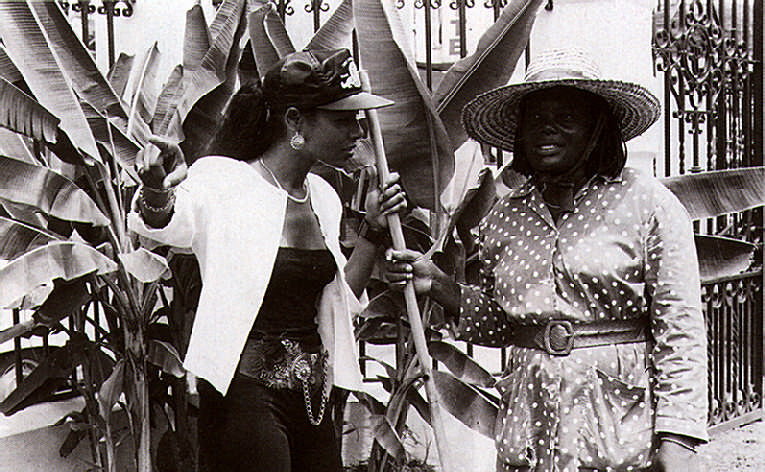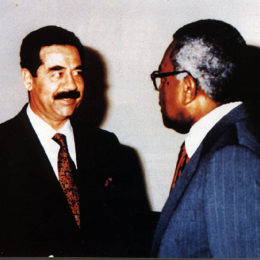Euzhan Palcy, thirty-four, was the first black woman to direct a major Hollywood studio film: A Dry White Season, starring Donald Sutherland, Susan Sarandon, Zakes Mokae and Marlon Brando. Based on a novel by the white South African writer, André Brink, A Dry White Season was a powerful indictment of the apartheid system. Palcy set the film in 1976, because that year “was a turning point in the struggle of the people of Soweto, South Africa, for their freedom.”
I met Euzhan for the first time in Martinique, at the Second Caribbean Film and Television Festival, Images Caraïbes. She was in great demand, and delivered the feature address at the Festival. She was also honoured by the town of Gros Morne, where she grew up as one of six children of a pineapple-factory worker and his wife. As a young girl, one of her passions was going to the movies. “Sitting in the dark theatres, it was a magical thing to see the light on the screen.” By the time she was 14, she knew what she wanted to be.
Growing up in Gros Morne provided inspiration for Palcy’s first feature film, Rue Cases Nègres (1982), based on the book by the Martiniquan writer Joseph Zobel. “Next to Gros Morne there is a city called Trinité, and people from Gros Morne would go there to work on the sugar plantations. I used to be with the children from the sugarcane plantations, play with them and be at school with them. It’s a world I know very well.”
Palcy worked on the first draft of her screenplay for Rue Cases Nègres while she was a student at film school in Paris. She studied with the daughter of the famous French director François Truffaut. Palcy gave her the script, and Truffaut read it and asked to see her. Palcy remembers the meeting well.
“I went to see him and he said, that’s fantastic, and he started to discuss with me some things. He gave me some good advice about the structure and said I should keep going. In fact he recognized many of his concerns in my film. He loves children, he has a problem with death, he hates in justice and he found all this in my script. We became the best of friends. When I had deep moments of depression, I would feel so alone, I would call him, he would ask me to come and we would talk and talk. He would always tell me, I’m not scared for you. I’m sure nobody would step on your foot, so I’ve no problems. He died. It was a great loss to me.”
She directed Rue Cases Nègres, the first feature film ever made in Martinique, at the age of 25. Set in the 1930s, it traced the struggle of a grandmother who sacrifices everything to ensure that her grandson escapes the poverty of the canefields and instead receives an education.
Palcy is very proud of the way the film was produced. Realising there were no producers in Martinique, she received a grant from the French Government, and then returned to Martinique to promote the project. “I found people, people from the streets, people who knew the novel, and had such respect for it because it is our history, and they said OK, we don’t have a lot of money, but we can give some money, an envelope with a small cheque.
“I contacted the mayors from the different cities and they gave me some subventions. Aimé Césaire (the mayor of Fort de France and author of the French classic Cahier d’un retour aupays natal) gave me something like 400,000 francs to make the film. When I went to the Venice Film Festival I was so proud to say that Martinique produced a film.
The money raised in Martinique was small compared with the full cost of production, but it was a symbolic step in the development of a film industry in the Caribbean. And Rue Cases Nègres was a great success. It received 14 international awards and ran for over two years in Paris. It ranks as one of the Caribbean’s classics, along with The Harder They Come (1971, Perry Henzel, Jamaica), One People (1986, Pim de la Parra, Suriname), Whatever Happened to Santiago (1989, Jacobo Morales, Puerto Rico) and the films of Alea, Solas and Grisal from Cuba and de Rooy from Curaçao.
Rue Cases Nègres featured the music of Malavoi from Martinique. This inventive group synthesized jazz with indigenous folk music and provided an inspired score for the movie. The film also made use of the creole language spoken by most people in Martinique, Guadeloupe and the ex-British territories of St Lucia and Dominica.
That was a deliberate decision. Palcy remembers being a student in France, and coming back to Martinique to produce a television series for children. In one programme she invited a number of young children to her home and they spoke to her in creole. When the programme was broadcast, it created a scandal: the viewers (or was it the authorities?) were shocked that creole could be used on television. There was a similar reaction when a newsreader wore her hair in braids, affirming her African heritage.
Palcy remembers such incidents vividly, and is proud of the progress her country has made in developing a national and Caribbean consciousness. She credits the Martiniquan writers Franz Fanon and Aimé Césaire for their work in recognizing the contribution of Africa and promoting the concept of negritude. Martinique and Guadeloupe are still departments of France, but independence is more than just a flag: “it is about being aware of who we are, our history and our common heritage with other Caribbean people.
Following the artistic and commercial success of Rue Cases Nègres, Palcy had many problems in making A Dry White Season. It took almost seven years to raise money and complete the film for release in 1989. If she had agreed to make another film like Rue Cases Nègres, she would have had no problem; but she wanted to make a political film about the situation in South Africa.
“Even if I wasn’t black and I was still the person I am, as a human being, I knew it was my duty and responsibility as a filmmaker. Our job is to bring things on screen, to make people laugh, to entertain them, but also to make them think and to inform them about what is going on in the world. They won’t be able to say we didn’t know what was going on.
She was not successful in raising money in France, and went to Hollywood where one of the studios showed an interest in the project. But after three years of hard work on the script by four different scriptwriters, Richard Attenborough’s film on South Africa, Cry Freedom, was released, and Palcy’s project was dropped. The studio didn’t believe the American public could be interested in two films about South Africa at the same time.
Luckily for Palcy, MGM then agreed to produce the film. She managed to persuade Marlon Brando to appear in it, even though he had retired from the cinema. “I went to see him, and I said MGM is going to do the film, but you know how Brando hates Hollywood. But because my producer is a very political person, she was able to let me make a political film in the way I wanted to make it. Even though the film is a Hollywood film, it is not a Hollywood film — it is my film. And Brando said ‘OK, I’ll do it,’ and I was so happy. I called the studio that dropped the project and said, “By the way, do you know that Brando is doing the film for free’ I could just imagine their faces.”
A Dry White Season was filmed in Zimbabwe. Palcy was threatened while working on it, because of its strong opposition to apartheid. Even during the promotion of the film she had a bodyguard. “The press would come in the room and see this big man, and I would say he was my publicist. He was very blond, and large and tall, and they would look at me and think, maybe he’s her husband. I would see confusion in their eyes. It was very funny.”
Palcy does not like to talk about her new projects. “The only thing I can say is that my next film will be a comedy, a comedy fantastic. Nothing to do with what I did before. But it is not the kind of comedy where people go to the cinema to have a good time, and two days later you ask them about the film and they don’t know. My film will have a message, something to make them think.”
Her new film begins production this year, in Martinique, Guadeloupe and France. It is called Simeon, Zouk Spirit. It stars Robert Liensol, and Jocelyn Beroard and Jacob Desvarieux from Kassav, the internationally famous group from Guadeloupe and Martinique that has made Zouk music popular. It is basically the story of Caribbean music and the impact it has had on the European public in the last ten years.
Euzhan Palcy is passionate about the need to develop a Caribbean cinema. She has supported the establishment of the Federation of Caribbean Professionals in Film and Video (FCPFV). She argues: “We need producers, we need people who believe in their culture, people who have the money, and understand that it is important for us to see ourselves on screen.”
When Euzhan Palcy first wanted to be a film director, people laughed at her. They told her father she would have to prostitute herself to succeed. Today, having directed two feature films, Palcy is recognized as one of the most exciting and talented young filmmakers in the business. The importance of that breakthrough cannot be underestimated. Palcy recalls: “They see that I’m successful and have a big film, but they don’t see anything about the struggle and the fight and the crying and the desperation. They don’t know anything about this.”
Euzhan Palcy is one of a long line of Caribbean visionaries, from Marcus Garvey to C. L. R. James, whose lives represent landmarks in the development of an independent region. “Caribbean films will not just stay in the Caribbean,” she says, “but will do exactly what Bob Marley did with reggae. That means go outside and invade the world and say ‘We are here, guys, now it’s our turn.’ That’s what I hope.”
Click here for an update on Palcy’s career, in a feature done for Caribbean Beat’s 25th anniversary issue

























